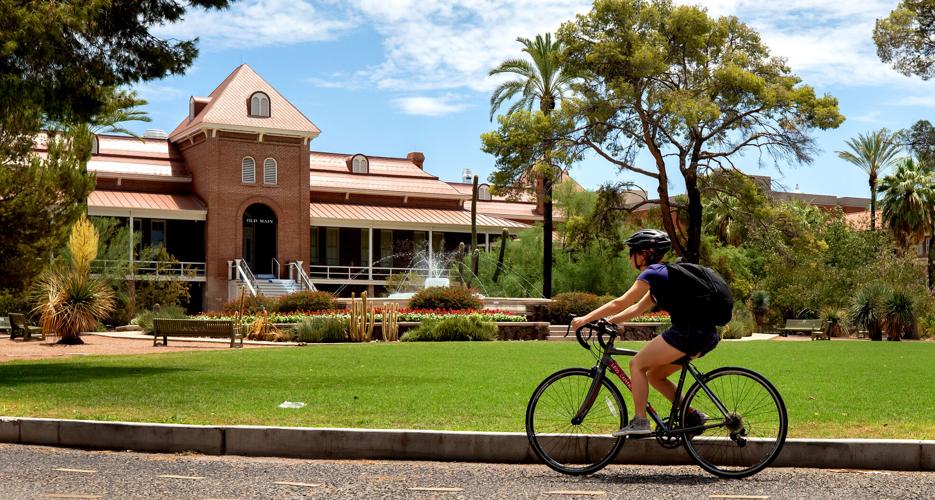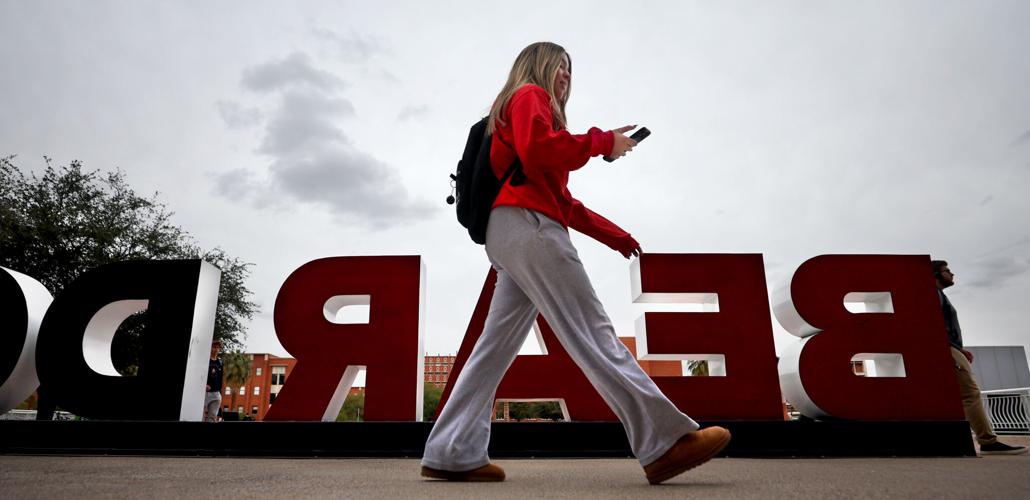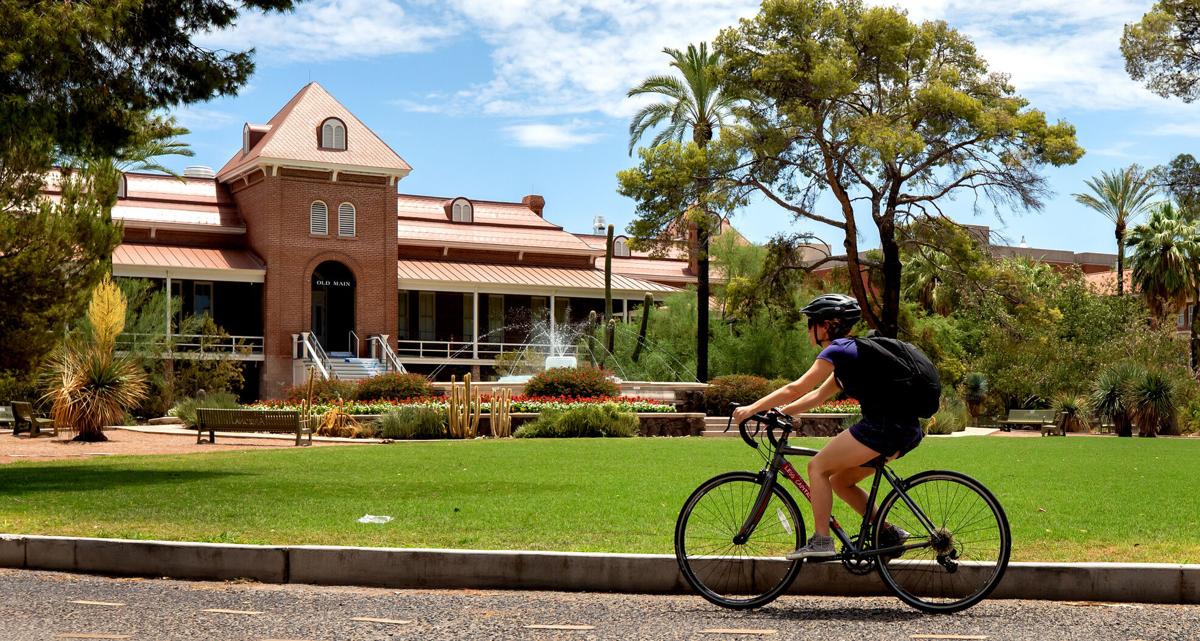All University of Arizona faculty will be asked to vote this week on referendums demanding delays in personnel cuts below the level of deans; reinvestment in academics; increased ranks of tenure-track faculty and graduate assistants; pay raises for those not on a tenure track; and downsizing of senior administration jobs.
The referendums were proposed Thursday when UA professors, lecturers and department heads hosted an all-faculty meeting for the first time since March 2020.
Some of the more than 640 attendees even suggested withholding final grades for the end of the semester until their demands are met.
“We see this meeting as an opportunity to advance solidarity and solutions to our gross administrative mismanagement crisis,” Faculty Senate Chair Leila Hudson, who presided over the Zoom meeting about UA budget cuts, layoffs and executive power, told attendees.
“Although so many of us are precarious employees who have to think twice before speaking up in these times of looming personnel cuts, forums like this, along with representative democracy on campus, provide us with some means of moving forward as a community,” Hudson said.

Faculty Senate Chair Leila Hudson says the UA has a “gross administrative mismanagement crisis.”
There was a sense of urgency. “We’re being asked to make decisions within the next two or three weeks with insufficient information that affect fundamentally the lives of staff and career track faculty,” said Gary Rhoades, an education professor, chair of the faculty’s financial recalibration committee and an associate department head.
The faculty can vote yes, no, or abstain on the referendums, which are:
— “Until there is detailed, transparent and clear financial data and guidance on financial rules, we demand that the senior administration of the university and colleges delay any cuts to personnel at any level below the deans, as these personnel are most central to serving our students and academic mission.”
— “It is time to reinvest and prioritize academic units. It is time to substantially downsize central and college senior administrators positions and personnel expenditures & to increase the ranks of the tenure-track faculty and graduate assistants, & to enhance non-tenure-track working conditions, pay and job security to better serve students who are paying more for less access to those who serve them.”
- “The democratically elected representatives and elected bodies of the faculty of the University of Arizona should have a guiding and determinative role in the academic and intellectual shape of the institution. We are critical to teaching students, conducting research, and engaging in extension/outreach in pursuit of our core values. The proper responsibility of the faculty includes active involvement in the hiring of administrators to implement our values and ensuring their accountability to the University and its public purposes.”
UA President Robert C. Robbins and Interim Chief Financial Officer John Arnold “acknowledge and appreciate the essential role that every faculty and staff member plays at the University of Arizona,” a spokesperson for the UA responded in a written statement. “They understand the frustration that arises from the difficult budgetary decisions that need to be made.”
The university’s budget deficit now stands at $162 million, though according to Arnold the projected deficit for next year is $52 million.
College of Education Professor Carol Brochin, one of the organizers of the meeting, said Thursday: “We do believe that we have the power to take back, to reclaim, to recenter the missions of the University of Arizona at a time when our senior administration and the Arizona Board of Regents have failed us.”
In response, an ABOR representative told the Arizona Daily Star the board “values and supports the work of the faculty and its input into campus decision making. The reality is the university needs to right size its budget and it will take a collaborative effort to get this done.”
Withhold grades?
During the Q&A portion of the meeting, many pointed fingers at Interim CFO Arnold.
“My perception is that John Arnold is basically running the university now and making command decisions, disrespecting leadership of colleges and doing everything in a non-transparent way,” one questioner said.
Arnold did not respond to comment inquiries from the Star. He was named to the interim UA position in December after the university’s financial crisis was revealed and is on leave from his role as executive director of ABOR, the board that oversees the UA. Arnold said in late February that layoffs would occur in phases throughout this spring, beginning with senior administration.
On Thursday Arnold released preliminary budgets for next year that will cut UA academic units by a total of $45.7 million, or 4.4%.
Robbins, meanwhile, announced April 2 he will step down as president at the end of his contract on June 30, 2026, or sooner.
During Thursday’s faculty meeting, the webinar’s chat function soon became overrun with questions about Arnold’s position.
“Who has the authority to fire Arnold?” asked Beverly Seckinger, a professor in the School of Theatre/Film and Television.
“What can we do? Refuse to post grades until John Arnold resigns?” Keith Maggert, a professor of molecular and cellular biology, asked.
“John Arnold is our effective president,” complained Lucy Ziurys, a regent’s professor of biochemistry.

UA President Robert C. Robbins, far right, with Regent Fred DuVal, middle, and UA Interim CFO John Arnold. Robbins has announced he’ll step down by 2026. “John Arnold is our effective president,” Lucy Ziurys, a regent’s professor of biochemistry, said at a faculty meeting Thursday.
ABOR responded in its written statement to the Star that the board “fully supports the tremendous work of interim CFO John Arnold in supporting this effort.”
Loss of tenured professors
The university needs to “recenter academic units,” said Rhoades, the chair of the faculty’s financial recalibration committee.
“The corporate university prioritizes unregulated central spending, sweeping money from academic units for reallocation to administrative priorities, leading to managerially structured deficits ... and perpetual austerity,” Rhoades said. “The corporate university invests in expanded managerial capacity, control and centralization, even as it reduces investment in and demands greater productivity from employees who do the university’s work.”
The share of faculty in the total personnel expenditures at the university has declined by 12% in the past eight years, Rhoades said. Tenure-track faculty accounted for 10% of faculty hired in 2022, down from 24% in 2017, which he said “compromises our mission.”
In a statement to the Star, Mitch Zak, a spokesperson for the university, said that “while the central administration, divisions and colleges all play a part in advancing our core mission of teaching, research, and outreach, the majority of the budget cuts aimed at saving $110 million in the upcoming year will come from reduced administrative expenses.”
“Traumatic working conditions”
Danny Clifford, a senior lecturer in English, said he wanted to talk about the “traumatic working conditions and unacceptable inequities of adjunct career-track and non-tenure track instructors.”
Over half of the faculty, or nearly 1,900 people, “do not have job security beyond short-term contracts” despite teaching “the majority of university classes,” he said.
He advocated that base pay for contingent faculty increase from $45,000 to $60,000.
“The challenges we face today should be embarrassing for this administration and demonstrate unacceptable leadership,” Clifford said, later adding that there was a “culture of fear.”
Despite this, administrative positions continue to grow, Rhoades said, adding that his committee has tried to get UA officials to disclose how many senior administrators, including deans, associate deans, assistant deans, associate provost and assistant provosts, were being cut. The university has not shared that information, he said.
“We have seen a growth in all of those positions that is greater than the percentage growth in students,” Rhoades said. “While at the same time we’ve seen almost no growth in staff, a decline in tenure-stream faculty, a decline in grad assistants, especially teaching assistants, and even the increase in non-tenure track faculty has been less than the increase in students.”

The University of Arizona campus. “ … The majority of the budget cuts aimed at saving $110 million in the upcoming year will come from reduced administrative expenses,” said Mitch Zak, a spokesperson for the university.
Administrative spending
Rhoades gave his presentation at the meeting alongside Jeff Michler, a professor in the College of Agriculture, Life and Environmental Sciences.
Michler railed against the current budgeting model, Activity Informed Budgeting, and spoke about gain sharing, which was implemented by former UA Provost Liesl Folk.
Gain sharing meant that “if units did not spend their money down to what the provost felt was an appropriate amount of savings, that money got taken away,” “taxed” by the university in order to give it to central administration, Michler said.
That, alongside subsidizing discounted tuition for out-of-state merit students and “subsidizing athletics“ since 2013, has harmed the academic units, the core of the university, he said.
In fact, according to Rhoades, the academic units subsidize 25% of the athletics department’s current budget.
Michler said 75% of the 61 units that Arnold said were deficit spending this year were non-academic.
“This looks like widespread overspending, but it’s mostly not by the revenue-generating academic units,” he said, contending most of the overspending units were administrative.
During the presentation, Arnold and Interim Provost Ron Marx sent an email to faculty listing their preliminary budgets to all colleges for fiscal year 2025. The budgets were decided during an “all-funds process” that required each college dean to show how they would cut from their budgets.
Michler said he tried to get each college’s all-funds presentations. Only one, his own college, would provide the information, he said.
“We’re not asking for something that doesn’t exist,” he said. “We’re not asking for something that will harm the university.”
Proposed law stalls
A bill to limit the role of shared governance at the state’s three public universities, which was gaining traction, has now stalled, State Rep. Nancy Gutierrez told the faculty at Thursday’s meeting.
According to Gutierrez, the presidents at Arizona State University and Northern Arizona were “not on board” with the bill, but “Dr. Robbins was.”
Zak, the spokesperson for the UA, denied her statements: “The Arizona Board of Regents and the University of Arizona have taken a neutral position on HB2735. Any suggestion to the contrary is false.”
The bill would require ABOR and university presidents to “consult” rather than “share responsibility” with faculty regarding educational and personnel matters.
Faculty and other opponents said it would destroy governing bodies such as the UA’s Faculty Senate. It would “put all power in the president,” UA professor Ted Downing, a former state legislator, has said. “The power to set up programs, hire and fire faculty, really all power.”
One of the bill’s sponsors, Gilbert Republican Rep. Travis Grantham, previously told the Star it was inspired by “the massive financial cliff” threatening to “bankrupt the university system.” While contending that faculty would still be able to participate in decision-making processes under his bill, he also said faculty criticizing it are “the most left of the left” who are “grabbing and clinging to power.”
Gutierrez, a Tucson Democrat, told the UA faculty Thursday that Democratic Gov. Katie Hobbs and her team “want to be a partner” with them.
“I wholeheartedly feel that you all are the ones, with your students and your staff together, that should be listened to, that should be honored, that should be respected,” Gutierrez said. “And I vow to protect that.”
Get your morning recap of today's local news and read the full stories here: tucne.ws/morning








